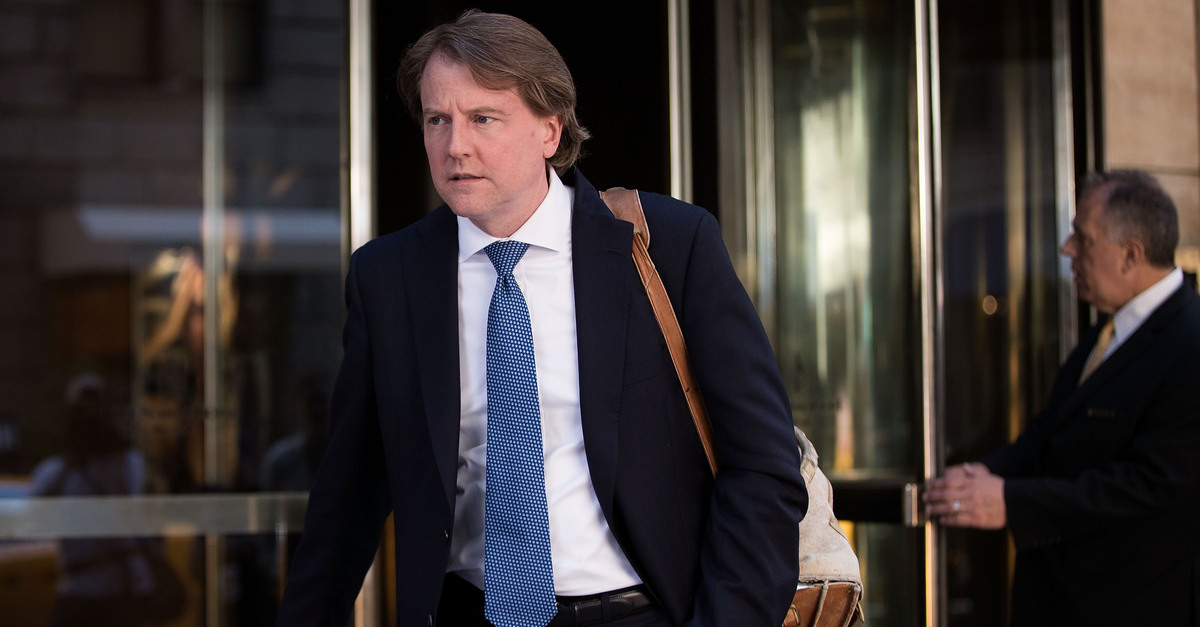
Former White House counsel Don McGahn has agreed to testify before the House Judiciary Committee about his role in former special counsel Robert Mueller’s investigation and subsequent report, according to court documents filed Wednesday.
Under the agreement, the panel will interview McGahn behind closed doors “as soon as possible,” rather than holding a public hearing. The interview will be transcribed and the transcript will be made public after McGahn’s attorneys, House counsel, and the Justice Department are given the opportunity to review it for accuracy.
The scope of the interview will be limited to “information attributed to Mr. McGahn in the publicly available portions of the Mueller Report,” any events that the report indicates involved McGahn, and whether McGahn’s statements to Mueller were truthful and accurately reflected in the report. McGahn is permitted to decline to answer questions deemed outside the agreed upon scope and the DOJ may instruct him not to answer certain questions, however, he will not be permitted to invoke executive privilege on “the publicly available portions of the Mueller report,” which would include the obstruction of justice volume of the report.
Given the agreed upon restrictions and parameters of the session, it appears that the committee is more concerned with confirming particular portions of the Mueller Report rather than seeking new information, specifically, whether Trump instructed McGahn to fire Mueller in an effort to end the investigation into Russian election meddling.
The Mueller Report stated that Trump twice ordered McGahn to go to Deputy Attorney General Rod Rosenstein and implore him to fire the special counsel.
Fearing that a repeat of the Richard Nixon-era “Saturday Night Massacre” was a real threat, McGahn told Mueller that he disobeyed the order. Mueller said that Trump’s attempts to influence the investigation were “mostly unsuccessful” precisely because White House staffers, McGahn included, “declined to carry out orders.”
Trump repeatedly denied that any such interactions took place, telling the media that he “never told then White House Counsel Don McGahn to fire Robert Mueller” but saying that he “had the legal right to do so.” Trump also suggested that McGahn lied about the encounters under oath “because he wanted to make himself look like a good lawyer.”
The agreement between McGahn, the DOJ, and House counsel likely signals an end to the protracted litigation over McGahn’s testimony that former President Donald Trump sought to block. Congress held McGahn in contempt after he obeyed a White House directive ordering him to ignore a 2019 subpoena to testify.
The Trump administration initially contended that the president’s closest advisors were “absolutely immune from compelled congressional testimony,” setting off a multi-year litigation roundabout through D.C.’s federal appeals court.
Initially, U.S. District Judge Ketanji Brown Jackson, rejected the Trump administration’s immunity claims, upholding the congressional subpoena for McGahn. But Jackson’s decision was vacated by a three-judge panel on the U.S. Court of Appeals for the D.C. Circuit which held that the House cannot enforce a duly-authorized subpoena against the executive branch using the judicial branch.
The full D.C. Circuit went on to vacate the ruling and decided to rehear the case en banc.
Last August, the full (en banc) panel ruled–in a 7-2 decision–that the House does, in fact, have the authority to use the courts as a method for subpoena enforcement. Later that same month, however, another panel of the same court ruled 2-1 that there is no statutory authority for Congress to enforce its own subpoenas whatsoever–setting up the second full en banc hearing which Wednesday’s agreement is likely to render moot.
Read the full court filing below.
Mcgahn Agreement 2021-05-12 by Law&Crime on Scribd
Colin Kalmbacher contributed to this report.
[image via Drew Angerer/Getty Images]